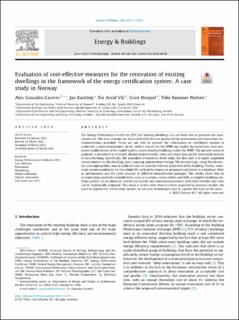Evaluation of cost-effective measures for the renovation of existing dwellings in the framework of the energy certification system: A case study in Norway
Journal article, Peer reviewed
Published version
Permanent lenke
https://hdl.handle.net/11250/3075515Utgivelsesdato
2022Metadata
Vis full innførselSamlinger
Sammendrag
The Energy Performance Certificate (EPC) for existing dwellings has not been able to promote the renovation rate. The main reasons are associated with the low quality of the assessment and renovation recommendations provided. These are not able to provide the information or confidence needed to undertake a renovation project. So far, neither reports for the EPBD nor studies by researchers have proposed modifications to the model used to assess existing buildings under the EPBD. The present research proposes a procedure to evaluate, design improvements, store and share data on the renovation process of each building. Specifically, the procedure is based on three steps, the first one is to apply simplified measurements on the dwelling, laser scanning and envelope testing. The second stage, using the electricity consumption data, was to calibrate and calculate the thermal properties of the building. Finally, tailor-made recommendations for the whole life cycle of the house are proposed and stored in a database. After an optimisation and life cycle analysis of different measurement packages. The results show that by incorporating currently available tools, such as scanners, smart meters and BIM, a complete building condition profile can be obtained, stored and shared, and renovation measures with their benefits and costs can be realistically proposed. This study is in line with what has been proposed by previous studies, the need to digitise the certification system, to use new technologies and to capture the trust of the users.

